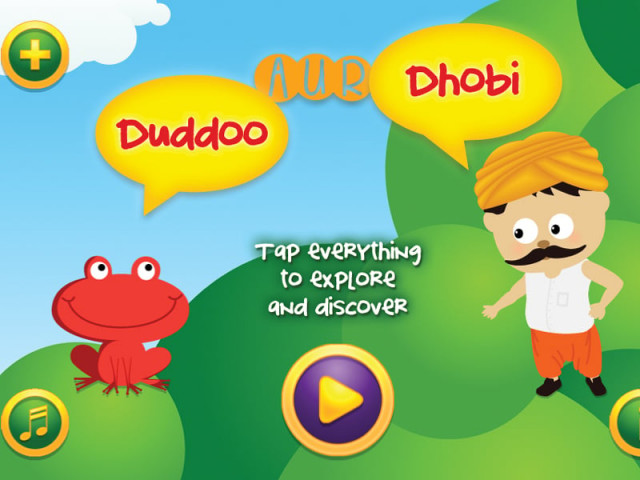Duddoo Aur Dhobi: New mobile app introduces Urdu nursery rhymes
App has received generally positive reviews; users say they want more.

“Our attempt has been to weave nursery rhymes into a highly interactive environment, making what we call a digital toy,” Imran explains. SCREENSHOT
If you happen to run across a toddler singing Urdu nursery rhymes of yore, like ‘Dhobi Aya’ (Here comes the washerman) or ‘O Baba Duddooa’ (O froggie!), chances are he may have learned it from a mobile phone app.
Released a few weeks ago on Apple’s App Store by JugnooMedia – a Lahore-based company – a free educational app titled ‘Duddoo Aur Dhobi’ (The Frog and the Washerman) already seems to be a hit in many households, if its reviews are to be believed. To capitalise on its success, the company hopes to release an Android version of the app shortly.
The app, which helps children learn counting in Urdu till 10, has mostly received five-star ratings for what users thought was good animation, catchy tunes and a highly interactive learning experience for toddlers.
Some users also requested the developers for more tunes and apps of a similar quality – indicating that there is an appetite for high-quality localised content, arguably an under-tapped market in Pakistan.
Although a few companies – Learningapps, ToffeeTV, UrduStudio and Creative Chaos to name but a few – have been catering to this market segment, it is still under-supplied.

“English nursery rhymes are easily available on all major platforms; it is not as easy to find quality content in Urdu,” says Zia Imran of JugnooMedia. “There aren’t many developers, particularly in Pakistan, who are producing Urdu content,” he tells us.
Imran says most developers do not consider this segment a big market because of the small number of smartphone users in Pakistan. “But this equation is changing,” he says. “One can buy a smartphone for Rs8,000 now, and this will come down to about Rs5,000 in a year or so,” he adds.
Imran – who is the former MD of the Pakistan Software Export Board – claims that ‘Duddoo Aur Dhobi’ provides the same high-quality content one can expect from a top-notch international app maker. “It is one of the main reasons behind the positive reviews we are receiving,” he said.
“Our attempt has been to weave nursery rhymes into a highly interactive environment, making what we call a digital toy,” Imran explains.
Besides providing interactive educational tools, JugnooMedia also wants to preserve the country’s culture and language using this platform. “If we don’t produce local language content based on our stories and characters, we will not be able to preserve our tradition and culture in the long run,” Imran says.
Imran hopes their titles will become popular in India as well, due to cultural and linguistic similarities. The technologically-driven giant could be a sizable market for them.
“Although there are no verifiable statistics available that can help measure the size of this market segment, almost a billion people understand Urdu or Hindi,” Rabia Garib – a developer at Karachi-based ToffeeTV – points out. Her company has been producing Urdu multimedia content for the iOS, Symbian and other platforms.
“Based on visitors stats on our website and our apps, there are more than 110 countries that frequently light our analytic map,” Garib tells us. Places like India, Middle East and the US are on top; however, countries like Italy and some in the Far East also bring in significant traffic.
Garib seconds Imran on developers’ lack of interest in producing Urdu content. “Considering there are such few apps in Urdu, we’d imagine that many developers perhaps don’t find as much money or return on investment in local language apps, as in others,” she says. “However, ToffeeTV received good market response since it started developing Urdu content,” she adds.
Published in The Express Tribune, February 27th, 2013.
Like Business on Facebook to stay informed and join in the conversation.



















COMMENTS
Comments are moderated and generally will be posted if they are on-topic and not abusive.
For more information, please see our Comments FAQ